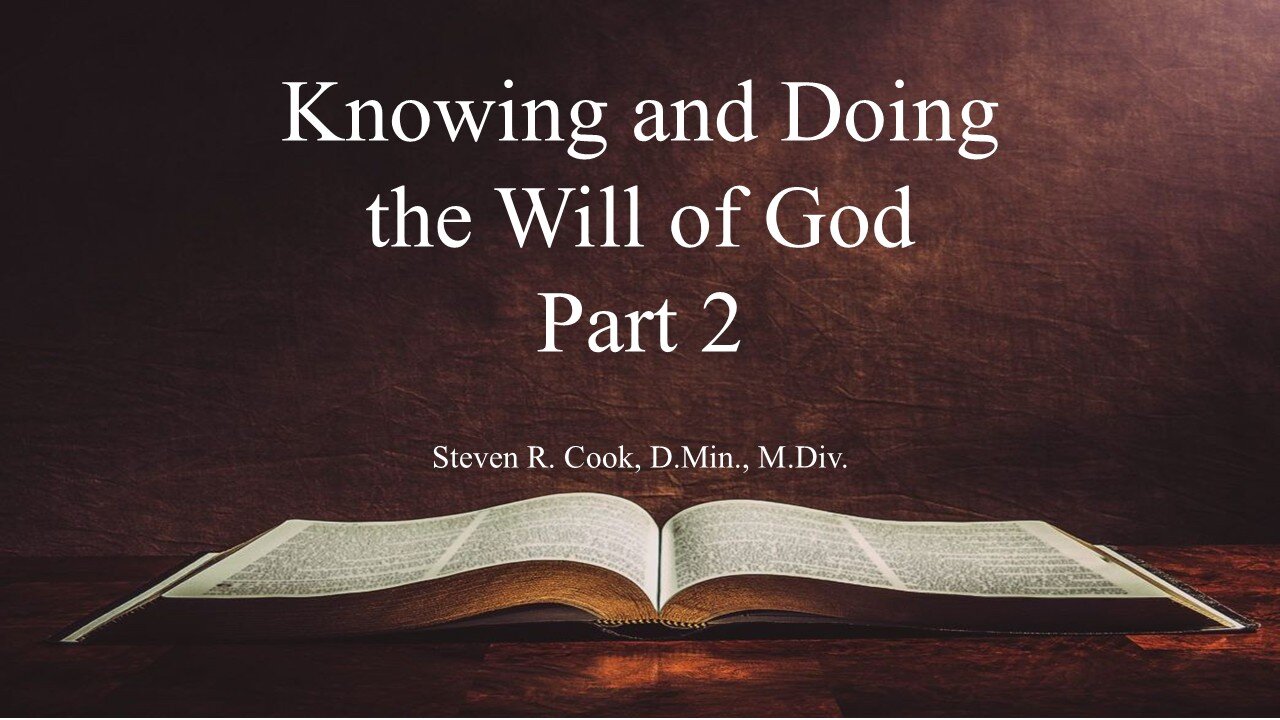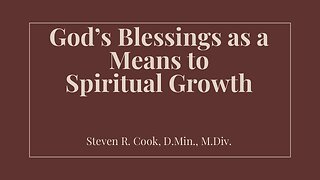Premium Only Content

Knowing and Doing the Will of God Part 2
Second, there is God’s directive will, which refers to His actively guiding His people to do what He expects. It is sometimes called His prescriptive will because it prescribes how people are to think, live, and relate to Him and others. For example, God directed Adam and Eve to be “fruitful and multiply” and to “rule” as theocratic administrators over His creation (Gen 1:28). After creating the garden of Eden, He directed them to “cultivate it and keep it” (Gen 2:15). He also gave them freedom, saying, “from any tree of the garden you may eat freely” (Gen 2:16), but also gave one prohibition, saying, “from the tree of the knowledge of good and evil you shall not eat, for in the day that you eat from it you will surely die” (Gen 2:17). Other examples include God directing Noah to build an ark (Gen 6:13-14), directing Abraham to leave his country and go to the place where God wanted (Gen 12:1), directing Moses to go to Egypt to liberate His people (Ex 3:10), and later to give them the Law so they could walk in His will (Ex 34:27-28). It should be remembered that the four Gospels reveal that Jesus was born and lived under the Mosaic Law code (Gal 4:4), and during His time of ministry, He directed others to obey that code (i.e., Matt 8:1-4; 23:1-3). However, that covenant and law code has been fulfilled by Christ and rendered obsolete (Matt 5:17-18; Heb 8:13). And now, God has given commands to Christians which are found in the New Testament. The book of Acts covers the first thirty years of the Church and is generally historical information, being descriptive but not prescriptive. Specific commands for the Christian living in the dispensation of the Church age generally start in Romans 1 and extend to Revelation 3. However, Jesus’ discourse in the Upper Room (John chapters 13-17), the Lord’s Supper (Luke 22:19-20), and the Great Commission (Matt 28:19-2) belong to the Church.
These biblical distinctions are important, for though all Scripture is written for us, only some portions of it speak specifically to us and command our walk with the Lord. Just as Christians would not try to obey the commands God gave to Adam and Eve in Genesis 1-2, or the commands God gave to Noah in Genesis 6-9, so we should not try to obey the commands God gave to Israel in Exodus through Deuteronomy. Christians are not under the Mosaic Law (Rom 6:14), which has been rendered obsolete (Heb 8:13). but operate under the Law of Christ (1 Cor 9:21; Gal 6:2).
-
 1:04:21
1:04:21
Thinking on Scripture
18 days agoGod's Blessings as a Means to Spiritual Growth
181 -
 13:42
13:42
Nate The Lawyer
19 hours ago $3.07 earnedINSANE Judge REMOVED For Lying Under Oath, Insurance Fraud & Stolen Valor
10.3K14 -
 38:32
38:32
Code Blue Cam
1 day agoHow Police Stopped a Potential Church Massacre...
42.8K12 -
 24:26
24:26
Actual Justice Warrior
1 day agoWelfare Queens RAGE OUT Over Food Stamp Cuts
16.5K53 -
 3:05:11
3:05:11
Inverted World Live
11 hours agoThe Halloween Special with Drea De Matteo and Sam Tripoli | Ep. 133
365K16 -
 2:57:52
2:57:52
Laura Loomer
14 hours agoEP154: Naturalized US Navy Medic From GAZA Exposed For Ties To Hamas
50.2K29 -
 35:45
35:45
Stephen Gardner
16 hours ago🔴BREAKING: Election Auditor EXPOSES Democrat Election Fraud Evidence!
57.4K75 -
 15:48
15:48
Sponsored By Jesus Podcast
20 hours agoHow to Stop Being JEALOUS | When Comparison Steals Your Joy
24.8K13 -
 3:56:59
3:56:59
DLDAfterDark
11 hours ago $20.79 earnedDon't Worry - Things Will Get SO Much Worse! Sometimes It Be Like That
40.1K9 -
 25:41
25:41
Robbi On The Record
17 hours ago $5.08 earnedThe Billion-Dollar Lie Behind OnlyFans “Empowerment” (Her Testimony Will Shock You) | part II
26.9K18